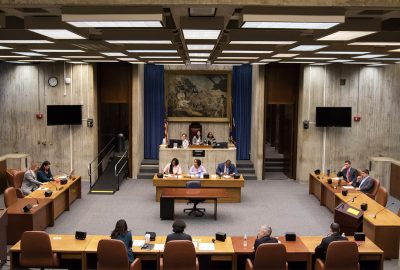
The Boston City Council Committee on Public Safety and Criminal Justice held a hearing Monday afternoon to review and consider funding for the Community Resources for Justice’s Overcoming the Odds program.
The OTO program, a collaborative project between the Boston Police Department and the Massachusetts Department of Correction, works to help reintegrate individuals within the DOC returning to Boston by providing individualized case management, including help with finding housing, substance abuse support, mental health support and employment opportunities, according to the CRJ website.
The project lost all federal funding in September of last year when its three-year grant expired, said CRJ’s Interim Deputy Director Gabriella Priest. This meeting allowed City Council members to learn more about the organization, and begin to consider how to allocate funds for the project in the future, she added.
City Councilor Andrea Campbell, the chair of the committee and sponsor of the hearing, opened the meeting by acknowledging the issue of ex-criminal re-entry in Boston.
“A large percentage of individuals entering the Department of Correction and the Suffolk County House of Corrections come from the city of Boston, and actually come from the neighborhoods which I represent: Mattapan, Dorchester, as well as Roxbury,” Campbell said. “These folks are in need of treatment, employment, housing and any other support we can give them.”
Within three years of release, more than half of the individuals in the MDOC and more than two-thirds of those in the SHOC will fall back into the criminal justice system, Campbell said.
“Successful re-entry … is incredibly important,” Campbell said. “But we know that folks trying often face incredible barriers to successful re-entry, including barriers finding job training and employment or housing.”
After her opening statements, Campbell handed over the discussion to a panel of several representatives involved in the reintegration process, including Priest, CRJ President and CEO John Larivee, BPD Reentry Coordinator Frank DeLuca, Director of Reintegration at the Suffolk County Sheriff’s Department True-See Allah and MDOC Assistant Deputy Commissioner Christopher Mitchell.
Mitchell said during the meeting that individualized case management through the OTO program is its most valuable feature.
“The supportive case management is the missing link that ties all of the pre-release programs and post-release programs into a coherent plan,” Mitchell said. “The CRJ folks coming in, leading and establishing rapport with the individuals and then helping them transition into the community is the program in my mind.”
Larivee spoke during the meeting about improvements made to the OTO program given inmate feedback. Larivee said panels offered to inmates about the OTO program before their release were updated.
“It was very clear that the individuals saw the language as a threat,” Larivee said. “So we very much changed the design of the letter that we send out, about the way the panels are conducted and who plays what role in the panels, to be one of understanding that yes, there’s accountability here, we’re welcoming you back.”
DeLuca said in the meeting he was upset by the loss of funding for the OTO program.
“It’s unfortunate that the funding ended for these programs because it’s certainly worthwhile,” DeLuca said. “They display successes in both [reducing] recidivism and cost effectiveness and I would hope that we can find some sort of source of money for these programs.”
Several people attending the meeting shared their own stories with re-entry and showed their support for the OTO program.
Ruark Bond, 39, of South Boston, a former repeat offender and participant in the OTO program, spoke during the meeting. Bond attested to the role his OTO case manager played in keeping him out of the prison system.
“My case manager for OTO, as soon as we met … we hit it off,” Bond said. “She wasn’t overbearing with the information, she let me say what I wanted to do and she always repeated: ‘This is for you. If you want to come do it, I appreciate it, but if you choose not to, you know where that gets you, and if you feel later on that things aren’t working out, give me a call.’”
Ada Pantoja, 36, of South Boston, Bond’s girlfriend, said she was thankful for the program’s support when he got out of prison.
“I was one of his supports when he came home, but I liked the fact that he did have the program and he had the support from them,” Pantoja said. “They gave him a bus pass … the wonderful suit that he had on today … it gave him at least an eye-opener that he can do this.”
Ryan Brennan, 27, of South Boston, a case manager for juvenile offenders, said the mix of high and low level offenders in Massachusetts prisons can be detrimental for those looking for smooth reintegration.
“We have a lot of people that are [accused of] much higher violent crimes set in lower security prisons and creating different issues there,” Brennan said “I think that helps create more stigma for people that are going to be reentering.”




